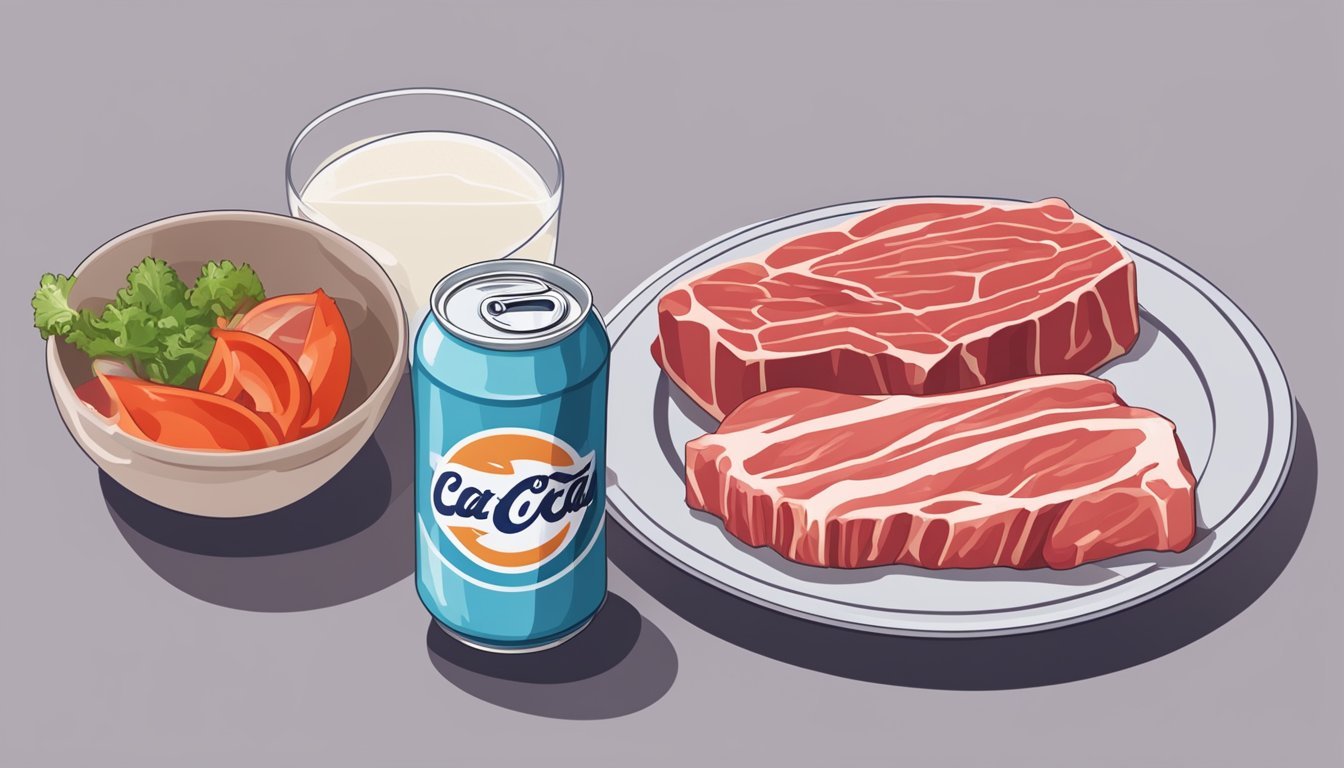Diet Soda Carnivore Diet
Impact and Considerations
The carnivore diet, a regimen centering exclusively on animal products, excludes plant-derived foods and has gained attention for its potential health benefits. This diet is based on the premise that human ancestors consumed primarily meat and fat, and therefore, modern health issues can be addressed by returning to a similar dietary pattern. Adherents consume meat, fish, dairy, and eggs, with a focus on avoiding processed foods. Mainstream beverages, particularly diet soda, come under scrutiny within this dietary framework. The inclusion or exclusion of diet soda in the carnivore diet is a subject of debate due to its non-animal origin and the presence of artificial sweeteners.
Diet sodas are often seen as a calorie-free alternative to their sugary counterparts, offering the appeal of sweet taste without the associated carbohydrate intake. They are artificially sweetened with compounds like aspartame, sucralose, or stevia, which do not provide calories or nutrients. Within the carnivore diet community, the consumption of diet soda is contentious. Some argue that because these beverages lack carbohydrates and sugar, they can be included in moderation, while others insist that the diet should be strictly animal-sourced, which excludes any form of soda, diet or otherwise.
The impact of diet soda on individuals following the carnivore diet is not uniform, as responses to artificial sweeteners may vary. While some individuals might not experience noticeable effects, others might find that these sweeteners affect their blood sugar levels or insulin response, potentially disrupting the goals of the carnivore diet. It's essential to consider that the primary aim of the carnivore diet is to promote overall health, requiring the elimination of foods and beverages that could interfere with this objective. Diet sodas, being a product of modern food processing, tend to be excluded by those who adhere strictly to the diet's principles.
Understanding the Carnivore Diet
The Carnivore Diet emphasizes the consumption of animal products and the elimination of plant-based foods, focusing on nutritional benefits and potential health improvements.
Foundations of the Carnivore Diet
The Carnivore Diet is based on the premise that human beings can thrive by consuming primarily animal products. The dietary approach consists of meats, including beef, poultry, fish, organs (such as liver and heart), and other animal parts. Proponents, including Dr. Shawn Baker, argue for the diet's simplicity and its ancestral alignment with diets of past civilizations.
Primary Foods: All types of animal meats, seafood, organs, eggs, and select dairy products.
Excluded Items: Plant-based foods, grains, legumes, fruits, and most sugars are excluded.
Benefits of a Carnivore Diet
Adherents of the Carnivore Diet report numerous health benefits, including weight loss, improved mental clarity, and a potential reduction in symptoms associated with diabetes and blood sugar regulation.
Weight Loss: Animal products can be highly satiating, potentially leading to natural calorie restriction and weight loss.
Health Improvements: Some individuals experience improvements in mood and symptoms of certain health conditions.
Risks and Considerations
Despite potential benefits, there are risks associated with the Carnivore Diet. Critics point out potential increases in the risk of heart disease, colon cancer, and other conditions due to the high intake of saturated fats and cholesterol.
Nutrient Deficiency: Solely consuming animal products may lead to a lack of certain nutrients found in plant foods.
Chronic Diseases: There is debate over the diet's long-term sustainability and its association with chronic health conditions.
Balanced information and consultation with healthcare professionals are crucial when evaluating the Carnivore Diet's suitability for an individual.
Dietary Components of Carnivore Diet
The carnivore diet is defined by its exclusive focus on animal-based foods and the elimination of carbohydrates, emphasizing high-protein and high-fat nutrition sourced solely from animal products.
Primary Foods on Carnivore Diet
The core of the carnivore diet consists primarily of:
Beef: steaks, ground beef, roasts
Lamb: chops, steaks, leg of lamb
Chicken: breast, thighs, wings
Pork: chops, belly, tenderloin
Organ meats: liver, kidney, heart
Seafood: fish, shellfish, mollusks
Eggs: whole eggs, yolks, and whites
Dairy: butter, heavy cream (though some individuals may limit dairy)
These foods are consumed for their high content of proteins, fats, vitamins, minerals, and other essential micronutrients.
Role of Animal-Based Foods
Animal-based foods are consumed for their dense nutrient profile. These items provide essential nutrients that are important for various bodily functions:
High-Protein: Supports muscle growth and repair, and acts as a source of energy.
Vitamins and Minerals: Necessary for a range of bodily functions including immune system support and bone health. Organ meats are particularly high in vitamins like A, B12, iron, and zinc.
Fats: Critical for energy, cell growth, and the absorption of fat-soluble vitamins (A, D, E, K).
Excluded Foods
Foods that are characteristically excluded from the carnivore diet include:
Carbohydrates: Such as those found in grains, sugars, and starches.
Plant-Based Foods: All fruits, vegetables, legumes, grains, nuts, and seeds are avoided.
Dairy: Some dairy products like milk, which contains lactose, a form of sugar, and soft cheeses that are higher in carbohydrates may be excluded by stricter adherents to the diet.
This exclusion is based on the principle that carbohydrates and plant-based foods are not essential for the human diet and can be replaced with animal-based sources that provide the necessary nutrients.
Diet Soda within the Carnivore Diet
The Carnivore Diet typically excludes non-animal products, prompting debate on the suitability of diet sodas. This section examines the components of diet sodas in relation to the diet and weighs the potential benefits and drawbacks.
Diet Soda Ingredients and Carnivore Diet Alignment
Diet sodas are sugar-free, carbonated beverages that utilize artificial sweeteners like aspartame, sucralose, or stevia instead of sugar. These sweeteners aim to provide a sweet flavor without the caloric intake of sugar. Diet sodas are also free from nutrients and may contain additives and preservatives. The Carnivore Diet focuses on consuming animal products, which positions diet sodas as non-aligning due to their artificial ingredients and lack of nutritional value from an animal source.
Artificial Sweeteners: May affect blood sugar levels and insulin response.
Additives: Provide no benefits to hydration or nutrients.
Hydration: Essential to life, but better sourced from water or animal-based drinks.
Pros and Cons of Including Diet Soda
Pros:
Sweet Cravings: Can temporarily satisfy sweet cravings without introducing sugar.
Convenience: Widely available and might offer a variety to drink options.
Cons:
Hydration: Less effective than water, does not support hydration as efficiently.
Inflammation and Ketosis: Artificial sweeteners may disrupt gut health and could potentially interfere with ketosis, an essential aspect of the carnivore diet for energy metabolism.
Nutrition: Offers no nutritional value, and does not support the nutrient-dense focus of the Carnivore Diet.
Additives: Potential health concerns associated with regular consumption of artificial additives.
Impact of Carnivore Diet on Health
Adopting a carnivore diet, which focuses primarily on animal products, can lead to significant changes in body weight management and health outcomes. The diet eliminates most carbohydrates, which may affect the body's nutrition, weight, and associated health conditions. It is vital to examine the diet's influence on obesity, long-term health, and psychological well-being.
Managing Weight and Obesity
Weight Loss Potential: A carnivore diet is high in protein and fat, which can lead to increased satiety and potentially lower calorie intake. Individuals may experience short-term weight loss, primarily due to a reduction in water weight and fat mass. Anecdotal evidence suggests that the diet may help manage obesity, but long-term effects are not well documented.
Nutrition and Body Weight: With its focus on meat, the carnivore diet might omit key nutrients found in a varied diet. However, proponents argue that it provides all the required nutrients without added sugars and processed foods, potentially influencing a decrease in body weight.
Long-Term Health Outcomes
Disease and Health Conditions: The diet's restriction of carbohydrates could impact diseases linked to high carb intake, such as diabetes, by maintaining lower blood sugar levels. The influence on artery health and liver function remains uncertain, as long-term studies on the diet's effects are lacking.
Reducing Inflammation: Consumption of red and processed meat has been linked to inflammation, a risk factor for various diseases. However, supporters of the carnivore diet claim that eliminating plant-based foods can reduce inflammation, purportedly alleviating conditions like autoimmune diseases.
Psychological Effects
Mental Health: While some report improvements in mood and reductions in conditions like depression and anxiety, there is insufficient scientific evidence backing the diet's effects on psychological well-being. Subjective reports suggest that stable blood sugar levels may contribute to a sense of well-being.
Sense of Well-Being: Following a strict dietary protocol may offer a sense of control, which can have a positive psychological impact. Nonetheless, the absence of long-term research data leaves the long-term psychological effects of the carnivore diet unclear.
Adjustments and Variations in the Carnivore Diet
The carnivore diet typically emphasizes a strict regimen of animal-based foods, but individuals may modify the diet to fit personal health goals and preferences, leading to different variations that can include other food groups or the adoption of intermittent fasting strategies.
Incorporating Other Food Groups
A strict carnivore diet consists primarily of meat, with an emphasis on consuming all parts of the animal. However, some individuals choose to incorporate additional food groups, such as dairy products or berries, for nutritional diversity or personal preference. This restricted inclusion aims to maintain the diet's low-carb and keto-friendly nature, while potentially offering a broader spectrum of nutrients and flavor.
Dairy Products: Often considered for their fat and protein content; includes cheese, butter, and milk.
Berries: A minimal addition due to their relatively lower carb content compared to other fruits.
Intermittent Fasting and Carnivore
Intermittent fasting (IF) is sometimes paired with the carnivore diet to further manage energy and support metabolic health. Those who practise IF on a carnivore diet typically consume their day’s allotment of animal-based foods within a constrained eating window, which can vary in duration.
Energy Management: IF may assist with blood sugar regulation and energy levels.
Eating Windows: Commonly used fasting protocols include 16/8 (16 hours of fasting with an 8-hour eating window) or one meal a day (OMAD).
In both cases, these variations are often personalized and may require careful attention to the body’s responses to ensure nutritional needs are met.
Comparing Carnivore to Other Diets
When evaluating the carnivore diet, it's essential to consider how it stands in contrast to other popular dietary approaches, particularly regarding macronutrient profiles and food sources.
Carnivore vs. Keto Diet
The carnivore diet and the ketogenic (keto) diet both emphasize low-carbohydrate intake, but they differ in their restrictive dietary patterns. The carnivore diet is predominantly animal-based, focusing on meats, fish, eggs, and certain dairy products, excluding all plant-based foods. In contrast, the keto diet adopts a high-fat, moderate protein, and low-carb framework, allowing for a wider variety of foods including plant-based oils, limited fruits, and low-carb vegetables.
Ketosis, a metabolic state targeted by the keto diet, may also occur on the carnivore diet due to the low intake of carbohydrates; however, the keto diet specifically aims to balance macros to maintain this state, often incorporating supplementary fats to achieve the desired ratio.
Carnivore vs. Plant-Based Diets
Plant-based diets stand on the other end of the spectrum compared to the carnivore diet. Plant-based diets typically include a balanced array of fruits, vegetables, grains, and legumes, boasting a diverse intake of fiber, vitamins, and minerals. They may include sugary foods and plant-based oils, which are excluded from the carnivore diet. Plant-based diets are not inherently low-carb or high in animal-based products, which is a stark difference from the carnivore diet that excludes plant matter entirely.
A key point in this discussion is the carnivore diet's absence of traditionally recognized sources of fiber found in grains and vegetables, which contrasts sharply without the fiber-rich plant-based diets. This difference can impact digestive health, as fiber intake is often associated with beneficial digestive functions.
Social and Ethical Considerations
Adopting a carnivore diet and the inclusion of diet soda may raise various social and ethical considerations. These include the impact of such dietary choices on environmental sustainability and personal beliefs, which are influenced by cultural norms and individual values.
Sustainability and Environmental Impact
The carnivore diet focuses on animal products and might involve the consumption of diet sodas as a zero-calorie beverage. Sourcing is critical, as ethically sourced meat can help mitigate environmental concerns. Here are key factors:
Food Sourcing: Individuals should consider the origin of their dietary choices, striving for sustainably raised animals to support animal welfare.
Environmental Concerns: The production of meat and other animal products requires significant resources, which has implications for environmental sustainability.
Cultural and Personal Beliefs
One's diet is often influenced by societal norms and personal choice, reflecting a complex interplay between cultural and personal beliefs. Here are relevant considerations:
Traditional Diets vs. Ancestral Health: Many societies have traditional diets that include plant foods, but proponents of the carnivore diet often cite ancestral health patterns focusing on meat consumption.
Personal Values: Ethical concerns regarding animal welfare are paramount, as individuals must reconcile their dietary practices with their beliefs about the treatment of animals.
These subsections encapsulate the social and ethical considerations one must weigh when pursuing a carnivore diet and incorporating elements like diet soda.
Frequently Asked Questions
When adopting the carnivore diet, individuals often encounter queries about beverage options, specifically diet soda. This section addresses those inquiries by clarifying common misconceptions and providing practical tips for transitioning to a meat-centric dietary pattern.
Addressing Common Misconceptions
Myth: Diet sodas are permitted due to zero calories.
Fact: Despite their lack of calories, diet sodas are not recommended on the carnivore diet as it focuses on consuming animal-based products and eliminating processed foods, including those with artificial sweeteners.
Artificial Sweeteners: Even calorie-free, these can affect insulin response and blood sugar levels, conflicting with the diet's aims.
Myth: The carnivore diet feels limiting without beverages like diet soda.
Fact: Animal-based liquids, such as bone broth, are nutritionally rich alternatives that align with the diet's principles and can substitute other drinks.
Community Support: Newcomers can seek guidance from experienced practitioners for expanding their beverage options while remaining within the dietary guidelines.
Tips for Transitioning
Meal Planning: It is essential to plan meals that include a variety of animal products to ensure nutritional balance and ease the transition away from prohibited items, such as diet sodas.
Beginner Challenges: Transitioning can be challenging, especially regarding familiar habits, such as drinking diet soda. Individuals may find it helpful to gradually reduce intake or replace it with carnivore-friendly drinks like water or herbal tea.
Coping with Cravings:
Strategy Description Replacement with water or herbal teas Substituting diet soda with compliant beverages can alleviate cravings over time. Seeking community support Engaging with others on the same dietary path can provide encouragement and accountability.
Science-Backed Evidence: Individuals should consider research that underlines the potential impact of non-animal products on their health goals within this diet.
By understanding these nuances, one can make informed decisions when restructuring their diet, aiding in a smoother transition to carnivore eating habits.
Conclusion
Individuals adhering to a carnivore diet prioritize consuming exclusively animal-based products. This dietary regimen comprises chiefly meat, fish, eggs, and certain dairy products, emphasizing nutritional density and the elimination of plant-derived foods. The inclusion of beverages such as diet sodas, which are characterized by artificial sweeteners and devoid of nutritional value, does not align with the core principles of the carnivore diet.
The presence of artificial sweeteners in diet soda—aspartame, sucralose, and stevia—could potentially affect insulin response and blood sugar levels. Although these effects may vary from person to person, it is crucial for individuals to consider the potential implications on their health goals.
Key Considerations for Carnivore Diet Adherents:
Opt for beverages like water, bone broth, and milk that maintain the diet's integrity.
Assess the potential health implications of consuming products with artificial additives.
In making informed decisions about their dietary choices, individuals following the carnivore diet should consider the overall health benefits and goals of the diet. Beverages like diet sodas that contain artificial ingredients may conflict with the objectives of achieving improved well-being through a nutritionally focused, animal-sourced diet.









